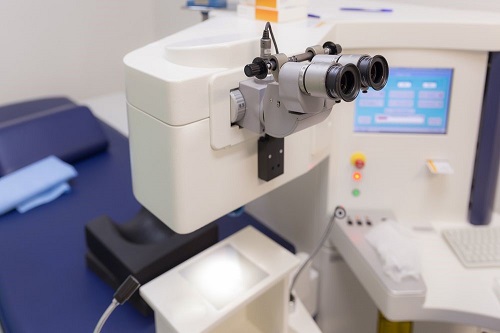
Important Signs It May Be Time to Undergo LASIK Surgery in Los Angeles
LASIK surgery can often be intimidating for many people. After all, the procedure calls for the use of a special laser to correct vision errors in the eyes. However, there is no denying that laser eye surgery in Los Angeles has been a scientific and medical marvel over the last few decades, restoring the vision of millions of people. (more…)

LASIK Surgery: What You Need to Know Before Going Under the Knife
Laser-assisted in situ keratomileusis, more commonly known as LASIK, is arguably the most popular type of refractive surgery today. Countless people with poor eyesight benefit from this procedure every year, and a lot of them achieve a 20/20 visual acuity after the surgery. If you are looking to undergo LASIK in Orange County soon, here are some important things you need to know. (more…)

LASIK FAQs and Other Good Questions You Should Ask Your LASIK Surgeon
LASIK in Orange County is one of the most effective ways to correct refractive errors in the eyes and is one of the most common eye procedures conducted in Orange County and the rest of the United States. Despite this, many people who experience vision issues find themselves a bit in the dark about LASIK surgery. With that in mind, we try to explore some frequently asked questions regarding LASIK surgery. (more…)

5 Concerns You Should Discuss with Cataract Surgeons Prior to Surgery
Cataract surgery can be a little unnerving for many patients, especially if they do not know anyone who has previously undergone the procedure. This is where having a good cataract surgeon in Los Angeles is an advantage since he or she can easily answer any questions and tell you what you should expect in a cataract surgery. (more…)

3 Mistakes You Should Avoid Before and After a Laser Eye Surgery
According to the World Health Organization, over 2.2 million people around the world live with vision impairment. Most of them are suffering from chronic eye diseases and uncorrected refractive errors. Thanks to advancements in eye care technology, particularly the introduction of laser-assisted methods, this figure is starting to fall. More and more people are finally having access to safe and quick treatments, such as laser eye surgery. (more…)

Cataract Surgery Recovery: Five Tips for a Smoother Recovery Period
The cataract surgeon tells us that cataract surgery, also referred to as Phacoemulsification, is a fast and straightforward procedure. Typically, the eye surgery operation is a day case. When the patient arrives at the hospital or clinic, the surgical team will have to prepare his or her eyes for surgery.
This involves the eye surgeon putting some drops in the patient’s eyes to dilate his or her pupils to make them wider. Also, the patient is asked to sign some consent documents and is handed a surgical gown to wear.
How Long Is Cataract Surgery?
When the patient is in the operating theater, the cataract surgery takes about 15 minutes and he or she will be discharged from the hospital when they feel ready to leave. Your visit will take no longer than four hours.
An eye surgeon can perform cataract surgery using eye drops to numb the area or else under local anesthetic. If you have cataract surgery with eye drops only, your eye surgeon will advise you to wear a transparent shield over your eye until you arrive home.
If your eye surgeon uses a local anesthetic, you will have to wear an eye pad and a shield for a few more hours until the anesthetic wears off.
What Are The Side Effects Of Cataract Surgery?
Right after surgery, your eye will water and feel a little gritty. However, don’t worry because that is a normal side effect. Also, your vision will be slightly blurred, and your eye may also feel sensitive to light and look red or bloodshot.
The drops that were used to dilate your pupils before surgery, will take at least 24 hours to wear off. During this time, don’t be alarmed if you notice your pupil is larger than average. Additionally, your vision will be blurred while you wait for the drops to wear off.
How Long Does It Take To Recover From Cataract Surgery?
Again, don’t freak out if your vision seems cloudy, distorted, or blurry when your cataract surgeon first takes off the eye shield. It can take a while for your visual system to get used to the removal of the cataract and get familiar with the intraocular lens used to replace the eye’s natural lens.
Some patients have claimed to see “wavy” vision or distortions during this familiarization period. This phenomenon, if it exists, should only last for about an hour.
Furthermore, red and bloodshot eyes are common because of the temporary damage to blood vessels on the white part of the eye (sclera) during cataract surgery. While the eye heals, the redness should disappear within several days. If the eye surgeon administered an injection of anesthesia through the skin into the lower portion of your eye, you may see some bruising that looks like a black eye. Again, this will also fade within a few days.
Most patients say their vision clears up within several hours after cataract surgery. However, everyone heals differently, and you may require at least a week or two before you see images in their sharpest focus.
Typically, you will have a follow-up appointment with your cataract surgeon the day after the procedure to ensure there are no complications. Also, if you feel pain or immense discomfort in the days following the visit, you should let your eye surgeon know.
Occasionally, some patients make known to their eye doctor some dry eye or “scratchiness” after cataract surgery. These feelings should lessen as the eye heals unless the person already had issues with dry eyes before having the procedure.
A complete cataract surgery recovery should happen within around a month when the eye is entirely healed.
What Are The Best Ways To Help Cataract Recovery?
Surprisingly, many patients feel very good and find they can easily get back to their normal activities even the day after cataract surgery.
Nevertheless, you should pay attention to a few preventive measures during the first week to guarantee you avoid any complications during your cataract surgery recovery.
Typically, your cataract surgeon will prescribe antibiotic eye drops to prevent infection, and anti-inflammatory eye drops to help lessen any internal inflammation. You have to apply the eye drops several times daily for at least the first week following surgery.
Revolving around how much postoperative inflammation you have, you may require the drops for a few weeks to a month. It’s recommended to use these drops precisely as prescribed.
For instance, oral pain relievers such as acetaminophen may be prescribed, if required. Normally, however, you should feel a little discomfort after cataract surgery.
To make sure you have a safe and quick recovery, read the advice below.
- Avoid driving on the first day following surgery – You should talk to your eye doctor about when you can safely get back behind the wheel since it’s all based on your recovery.
- Don’t do any strenuous activities for a few weeks – Don’t do any rigorous exercise and activities that involve heavy lifting for a few weeks to reduce the possibility of increased eye pressure. The reason being is that high eye pressure can disrupt the incision before it completely heals. You should avoid getting into positions that place your head below your waist. For instance, bending over can increase eye pressure and should be avoided immediately after surgery.
- Avoid Pools And Shower Carefully – After cataract surgery, exposing your eyes to water increases your risk of infection. So, do your best to avoid pools and shower carefully until your eye has healed completely. Most eye surgeons will recommend giving yourself at least one night of sleep before showering and don’t allow a stream of water to hit your eye directly. You should ask your doctor when it is safe to start swimming or using a hot tub. In many instances, you will resume these activities within a few weeks.
- Protect Yourself From Irritants And Other Trauma – When you arrive home from your cataract surgery, it is normal to feel that you have an object in your eyes such as a particle of sand or an eyelash. Overall, expect your eyes to feel sensitive to the environment for about a week after surgery. It’s a good idea to get wraparound sunglasses to protect yourself from exposure to dust, pollen, and dirt, and these sunglasses will help with sensitivity to light.
Additionally, your eye doctor will provide you with an eye shield for you to put on while sleeping during your recovery time to prevent you from rubbing or touching your eyes.
Abide By Your Cataract Surgeon’s Orders
You should ask your doctor about precautions you can take, such as the ones listed above, and the appropriate timelines for getting back to normal activities. Also, you should contact your cataract surgeon right away if you experience any of the following symptoms after your cataract surgery:
- Vision loss
- Spots (floaters) or flashes in your vision
- Eye pain
- Nausea, vomiting, or excessive coughing
Make sure to follow the dosage instructions of the prescribed medications, such as eye drops or pain relievers. Every patient and every eye has particular requirements, so your eye doctor will give the best directions for a successful recovery.
On the whole, you can carry out these activities within a couple of hours of your surgery:
- Computer work
- Light TV watching
- Showering or bathing
To get the best cataract surgery recovery results ever possible, make sure to follow your doctor’s instructions on how to protect your eye following your procedure. Typically, these instructions are provided to you as a handout that you can take home on surgery day.
If you require cataract surgery in both eyes, your eye surgeon will usually wait about a couple of days to two weeks for your first eye to recover before performing a procedure on the second eye.

Preparing Yourself for Laser Eye Surgery: Quick Tips to Keep in Mind
If you are scheduled to undergo laser eye surgery in Orange County in the near future, it is only natural that you want to make sure that the procedure goes well from start to finish. Choosing a trusted and experienced laser eye clinic and surgeon is one step you can take to ensure that, but that isn’t the only step measure you can take prior to the actual procedure. With that in mind, make sure you follow these simple tips to prepare yourself for successful laser eye surgery: (more…)
Contemplating About Cataract Surgery?
If your doctor has diagnosed you with cataracts and you’re looking at who will perform the cataract surgery, the whole thing can feel overwhelming and scary. But knowledge is power. Below, you’ll find the information that can help you make empowered, informed decisions with your cataract surgeon to design the treatment plan that is right for your eyes.
What are Cataracts?
Cataracts occur when the lens of your eye becomes clouded, which can impair your vision. Most cataracts occur in older people, although anyone can get them. Some cataracts don’t cause enough symptoms to require surgery, and people can manage them with prescription or reading glasses. Other cataracts, even though they are asymptomatic, still require surgery because they prevent treatment of some other eye condition. And some people are very bothered by their cataracts, which they find make it difficult to see and drive, especially at night. The only way to remove cataracts is with surgery.
How are Cataracts Treated?
Cataracts are treated with a surgery to remove the clouded, natural lens of your eye and replace it with an artificial lens called an intraocular lens. Cataract surgery is very common, and the rate of complications is very low. Before surgery, your doctor will examine and measure your eyes and you may be prescribed eyedrops to use ahead of time. On the day of the surgery, you’ll follow your surgeon’s pre-op instructions about whether to eat or drink. Your surgeon will numb your eye with drops, and possibly give you a medication to help you relax. You’ll be awake during the surgery, although you won’t be able to see what the surgeon is doing to your eye. Once the old lens has been removed and the new lens inserted, the surgeon will give you a shield to protect your eye. After you go home, you’ll need to use eye drops and continue to use the eye shield until your eye has healed.
What Can I Expect After Cataract Surgery?
Most people see better after cataract surgery. You may notice that colors seem brighter, since a cataract can tint your vision brown or yellowish. Most of the discomfort from surgery should be gone in a couple of days, and complete healing usually takes place within eight weeks.
Cost
If you’re eligible for Medicare, it usually covers cataract surgery. Most private insurance companies cover cataract surgery as well. Both Medicare and private insurance may have requirements that your vision be tested and shown to be at a certain level before they will approve your coverage.
Choosing a Cataract Surgeon
It’s important to choose a surgeon that you’re comfortable with. Your surgeon wants you to have the best care and the best vision possible and to understand any procedure before you agree to it. Choosing to have cataract surgery in Los Angeles might require a lot of research, but it shouldn’t be frightening. Take the time to work with your surgeon and ask questions, and enjoy your healthy eyes for many years to come.
LASIK Eye Surgery: Planning Your Recovery
You’ve done your homework, consulted with your surgeon, and together you’ve decided to go ahead with LASIK in Los Angeles. You’re anticipating being free of glasses and contacts, and ready to get on with your life! But wait–not so fast. While LASIK has a very short recovery time, most people find that a little planning can make the process more bearable. So what are some things to think about when recovering from LASIK eye surgery?
How Long Does Recovery Take?
Healing after LASIK surgery is typically very rapid with minimal pain and irritation. Within 24-48 hours, your vision should be noticeably improved, and typically you will have a follow-up appointment scheduled. During those 24-48 hours, you’ll need to follow instructions from your surgeon. Typically you will be instructed in ways to protect your eyes (such as wearing goggles in the shower) and on appropriate medications (such as eye drops). Most people find they need to take it easy until their vision returns.
What Are Some Things I Can Do While I’m Recovering?
If you like to read or watch television, the prospect of waiting around for a day before your vision completely recovers can be daunting. A nap right after surgery is helpful, but you’ll want to rest most of the first day. You also need to consider how you’re going to eat. This is where a bit of advance planning can make all the difference.
Entertainment
-Consider audio books. Available online or from your branch of the Los Angeles public library, audio books can be enjoyed even while your vision is returning. Before surgery, consider loading a few onto your phone or mp3 player so that all you have to do is switch them on.
-What about music? Los Angeles has the world’s premier entertainment industry. Treat yourself to a new album from your favorite band, load it onto your media devices, and relax and enjoy it.
-Family and friends. If you can, invite family or a friend to stay with you while you’re recovering. You’ll need a ride home from surgery, and it can be helpful to have a second pair of hands (and eyes) in the house. As a bonus, you’ll have someone to talk to as your vision starts to recover–and that’s an exciting moment!
Practical Considerations
Think about how you’re going to handle basic necessities, like food and hygiene.
-Your surgeon can give you instructions about how and when it’s safe to take a shower. Consider that you’re not going to be able to wear eye makeup at first, and that your normal skincare regimen might need to be adapted if it involves creams or treatments around the eyes. (It’s a good idea to ask your surgeon for details.)
-Lay in a supply of frozen foods or pre-program the numbers of a few good takeout places into your phone. Until your vision clears you may not want to use knives in the kitchen, and you probably won’t feel like cooking anyway, so take advantage of the amazing cuisine scene in Los Angeles and let someone else prep dinner.
Follow Instructions
Remember, the instructions your surgeon gives you after surgery are designed to make your LASIK recovery as short and smooth as possible while protecting your eyesight. Following these instructions meticulously and refraining from bad habits are the best way to get back to normal, and to ensure the health of your eyes.
What Is Astigmatism?
Astigmatism means that the lens of your eye isn’t the right shape for clear vision. Sometimes this is described as having a lens shaped more like a football, while a normal lens resembles a baseball. Astigmatism can make it difficult to see, and is usually corrected with glasses and contacts. But if you have astigmatism you’ve probably used glasses and contacts for years, and have decided that they don’t work with your lifestyle–or you’re just tired of not being able to see when you wake up in the morning. Perhaps you’re wondering whether the types of laser eye surgery has available can treat astigmatism, and if so, which one is best?
How Does Laser Eye Surgery Work?
Laser eye surgery in Los Angeles uses a laser to reshape your cornea and/or the tissue underneath so that it can refract light properly. Different types of laser surgery are appropriate for different errors of refraction (nearsightedness, farsightedness, and astigmatism). For astigmatism, LASIK is often the type of surgery that is chosen. Your surgeon will discuss which type of surgery is right for you (see below).
Who Should Consider Laser Eye Surgery?
People with astigmatism often wonder whether surgery will make much of a difference in their lives. After all, they can usually see fairly well with glasses and contacts, so why consider surgery?
You might consider laser surgery to treat your astigmatism if:
-Your astigmatism is mild to moderate. People with mild to moderate astigmatism often experience very good vision correction after laser surgery.
-You’re feeling like glasses and contacts don’t work with your lifestyle. People who enjoy the outdoors, are avid swimmers, or who just hate hunting for their glasses in the middle of the night tend to report an improved quality of life after laser surgery.
-You work in an industry where glasses and contacts are a disadvantage. This includes those with active jobs, such as first responders; professional sports players; and those in the entertainment industry. Laser surgery can free you to concentrate on work, without worrying about whether you’re going to lose a contact or have your glasses knocked off.
Which Type of Laser Eye Surgery Should You Consider?
Astigmatism can be successfully corrected with LASIK eye surgery, PRK, and LASEK, so which type of surgery should you have? Time to call in the experts. Your eye surgeon is the best resource when you’re trying to choose between various types of laser surgery. Different surgeries are appropriate for different types of vision correction, and only after examining your eyes and discussing lifestyle factors with you can your surgeon be sure which type is right for you. Schedule a consultation with your surgeon, take your time, and discuss all your options. Soon, your astigmatism could be just a memory, and your vision will be better than ever!






